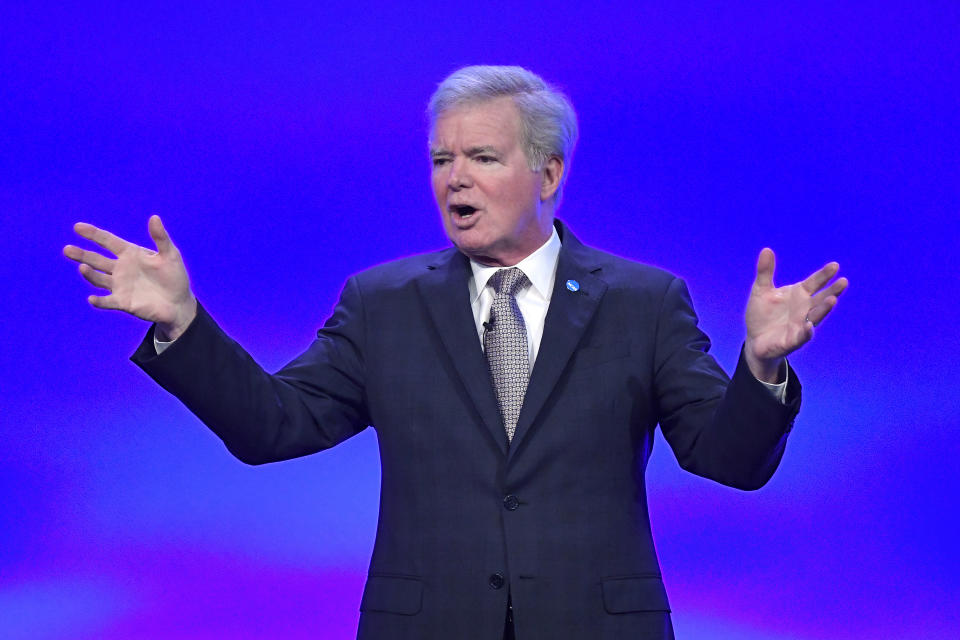NCAA's Mark Emmert: ‘We want to preserve the character and quality of the uniquely American phenomenon of college sports’

The federal government’s potential involvement in the compensation of college athletes got started on Tuesday with a United States Senate hearing regarding the name, image and likeness rights of college players.
The hearing included statements from NCAA president Mark Emmert, Big 12 commissioner Bob Bowlsby and other college administrators. In his opening statement, Emmert said the NCAA may need help from the federal government when it comes to laws governing athletes’ image rights. The NCAA has been open to help at a federal level after states like California and Florida passed laws that allowed athletes in their states to receive third-party compensation.
“College sports in America is at a critical juncture: while a record number of college athletes are benefiting from more opportunities than ever before, there is a legitimate concern about the fundamental fairness of our system,” Emmert said in his opening statement. “We share that concern, and NCAA schools and conferences are currently evaluating reforms to give athletes opportunities to take advantage of their own [name, image and likeness]. We believe that these efforts will address the concerns that have been raised about how to treat student-athletes equitably. But the process will take time, because we need to make sure that we operate consistent with two principles that are not always aligned. On the one hand, we want to allow opportunities for students to benefit from their NILs. On the other hand, we want to preserve the character and quality of the uniquely American phenomenon of college sports. And with ongoing serial litigation and NIL legislation pending in over half the states, we may need your help to accomplish this on a nationwide basis.”
As we all know, college athletes are prohibited by NCAA rules for making money off their name and image. While it’s unclear how the state laws in California, Florida and other states would be enforced and mesh together with current NCAA rules after they go into effect, the NCAA and its member schools don’t want to be in a situation where there are multiple image and likeness laws across the country with varying discrepancies.
The NCAA finds itself in this situation because of its own inaction. Had colleges and universities been proactive and taken strides to loosen the stringent rules regarding athlete compensation it’s fair to wonder if the California law that started this whole thing would exist in the first place. But it does, because the NCAA has long been more reactive than proactive.
The California law, which goes into effect in 2023, was passed in September. In October, the NCAA said it would “immediately consider updates” to its current image rights rules but didn’t give any specifics regarding changes or the timeline for them other than saying the changes must be implemented by January 2021.
KU chancellor: ‘We must preserve and protect the collegiate athletic model’
The committee is led by Kansas Sen. Jerry Moran (R) and one of the people testifying Tuesday is Kansas chancellor Douglas Girod. In his opening statement, Girod says that the school “acknowledges that it is a new day in college athletics” but also says that the collegiate athletic model must be preserved and protected.
Girod makes no reference to the college basketball corruption trial or the NCAA investigation into the Kansas basketball program in his opening statement. Kansas basketball was given multiple Level I NCAA penalties in the wake of the FBI trial regarding payments during the recruitment of two players.
“KU acknowledges that it is a new day in college athletics, and if there is an opportunity for student-athletes to earn value from their name, image and likeness, we should support them and provide reasonable guardrails that will protect them and the integrity of the game while maintaining successful educationally-based athletic programs across the country,” Girod said in his statement.
“This is a complicated policy matter, and none of us has all of the answers. That’s why it is important that we are having these discussions. But no matter what solutions we pursue, there are two ironclad principles that should inform us every step of the way: We must continue to prioritize what is in the best interests and welfare of our student-athletes and we must preserve and protect the collegiate athletic model.”
Senate working group launched in December
Tuesday’s hearing won’t produce much substantively in the way of legislation. At least immediately. Rather, it’s the first step of what will likely be many in the government’s possible role influencing NCAA rules. Any federal law would first need to be crafted into a bill to get through committee and onto the Senate floor and eventually passed through Congress.
The hearing also comes two months after Sen. Chris Murphy (D-Conn.) and Sen. Mitt Romney (R-Utah) announced the creation of a working group to study the rights of college athletes.
“College athletes are being used as commodities to make money for the NCAA, colleges and corporations, while not being compensated for the work they do, nor given the appropriate health care and academic opportunities they deserve,” Murphy said in a December statement tied to the launch of the working group. “That’s plain wrong. The majority of executives and coaches who are getting rich off college athletics are white, while the majority of players at the big time sports programs are black. This is a civil rights issue and I’m glad to launch this bipartisan working group to fix the inequities in this broken system.”
– – – – – – –
Nick Bromberg is a writer for Yahoo Sports.
More from Yahoo Sports:

 Yahoo Finance
Yahoo Finance 
